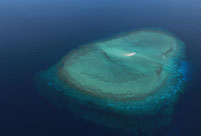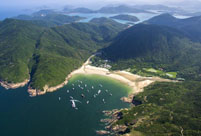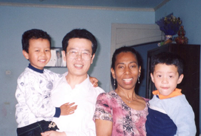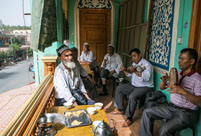

Elena Pankova and her friends flew directly from St. Petersburg to Sanya, a tourist city in southern China's tropical island of Hainan, not just to enjoy the sunshine on the beach.
Pankova's holiday also included receiving therapy at a local traditional Chinese medicine (TCM) hospital.
Each day, Pankova receives two hours of therapy at Sanya Hospital of TCM, then spends the rest of the day sunbathing. Her two-month trip, which combines travel with TCM treatment, is part of a growing industry on the island -- medical tourism.
"Modern Western medicine has little effect on me, so I came to Sanya to try TCM therapy," said Pankova.
Pankova is one of tens of thousands of Russians who flock to Hainan every year. The island province has received 800,000 Russian tourists in the past seven years.
Almost 80 percent of them have tried some form of TCM therapy during their stay -- either to treat a particular ailment or simply to improve overall wellness, health authorities said.
The boom is particularly felt in Sanya, where Russian-language advertisements for acupuncture and cupping have popped up across the city.
Sanya Hospital of TCM has treated more than 40,000 patients from Russia and Central Asia since it introduced "TCM tours" in 2002.
"Russian Prime Minister Dmitry Medvedev and Kazakhstan President Nursultan Nazarbayev have been treated at our hospital," said Wang Tiansong, president of the hospital.
To meet the rising overseas demand for TCM therapies, the hospital built an international healthcare center in 2016 to provide medical treatment specifically for foreign patients.
DISEASE PREVENTION
Zang Jinpeng, an acupuncturist at the hospital, treated his first foreign patient five years ago. Since then he has started to learn Russian to allow him to communicate better with patients.
Besides providing patients with acupuncture, cupping, tuina massage, and herbal medicines, some of the most well-known TCM treatments overseas, Zang often gives TCM lifestyle information on how to keep fit and prevent diseases.
"I think Chinese medicine focuses on helping prevent diseases and reduce chances of getting sick," said Zang.
Patients from Russia and Central Asia are more open to trying TCM as these countries have had frequent exchanges with China over many years, said Zang.
"TCM is centered around being green and natural, making it compatible with many Russians' passion for nature," said Yana Zhuravleva, a Russian national who is the marketing manager at Sanya Hospital of TCM.
Many Russian patients turn to TCM therapies for help after Western medicine has no effect, said Zhuravleva.
At the hospital, foreign patients are first given a physical health examination, then doctors create a specific treatment plan for them.
When they finish their treatment and prepare to leave Hainan, patients are given a flash drive containing their medical records for future treatment.
STRICT REGULATIONS
The boom in medical tourism also brings some problems.
In 2016, Sanya Hospital of TCM treated 8,000 foreign patients, but that number represented just a small proportion of foreign patients who came to Hainan for medical tourism.
"It is the private TCM institutions that received the majority of foreign patients," said Wang.
However, unregulated private clinics, exaggerated treatment effects, and a lack of qualified TCM practitioners constrain the sound development of the medical tourism market in Hainan, according to the provincial TCM administration.
Hainan has been mulling over new laws to help regulate medical tourism.
In August, the province will unveil two new regulations on TCM services and the construction of a TCM tourism model zone.
"The move will ensure order in the industry including therapy costs, safety standards and service quality, which will contribute to better medical care and enhance the experiences of visitors," said Xu Qingning, deputy director of Hainan Administration of TCM.
China put a national law on TCM into effect on July 1, which aims at regulating Chinese medicine as well as the training of medical personnel.
The new law will improve the global influence of TCM and boost international cooperation and exchanges, said Wang.
 Magnificent view of Nansha Islands in South China Sea
Magnificent view of Nansha Islands in South China Sea Aerial view shows scenery in Hong Kong
Aerial view shows scenery in Hong Kong China builds world’s first offshore fish farm
China builds world’s first offshore fish farm A Foreigner's Chinese Dream and Love for China
A Foreigner's Chinese Dream and Love for China 5,000-year-old Chinese beer recipe goes down a storm in US
5,000-year-old Chinese beer recipe goes down a storm in US World's first driverless rail transit system unveiled in Hunan
World's first driverless rail transit system unveiled in Hunan World's largest cluster of Miao villages in Guizhou
World's largest cluster of Miao villages in Guizhou Daily life in Kashgar, China's Xinjiang
Daily life in Kashgar, China's Xinjiang Top 10 Chinese tech and engineering marvels
Top 10 Chinese tech and engineering marvels Top 10 most sustainable cities in China
Top 10 most sustainable cities in China Top 10 European patent applicants in 2016
Top 10 European patent applicants in 2016 The power of 'She' in China
The power of 'She' in China Seven most beautiful art museums in China
Seven most beautiful art museums in China Liu Xiaobo a victim led astray by West
Liu Xiaobo a victim led astray by West India uses Bhutan to stir up border tensions
India uses Bhutan to stir up border tensions China growth model attracts global interest
China growth model attracts global interest Analysts question probity of purchase agreement
Analysts question probity of purchase agreementDay|Week